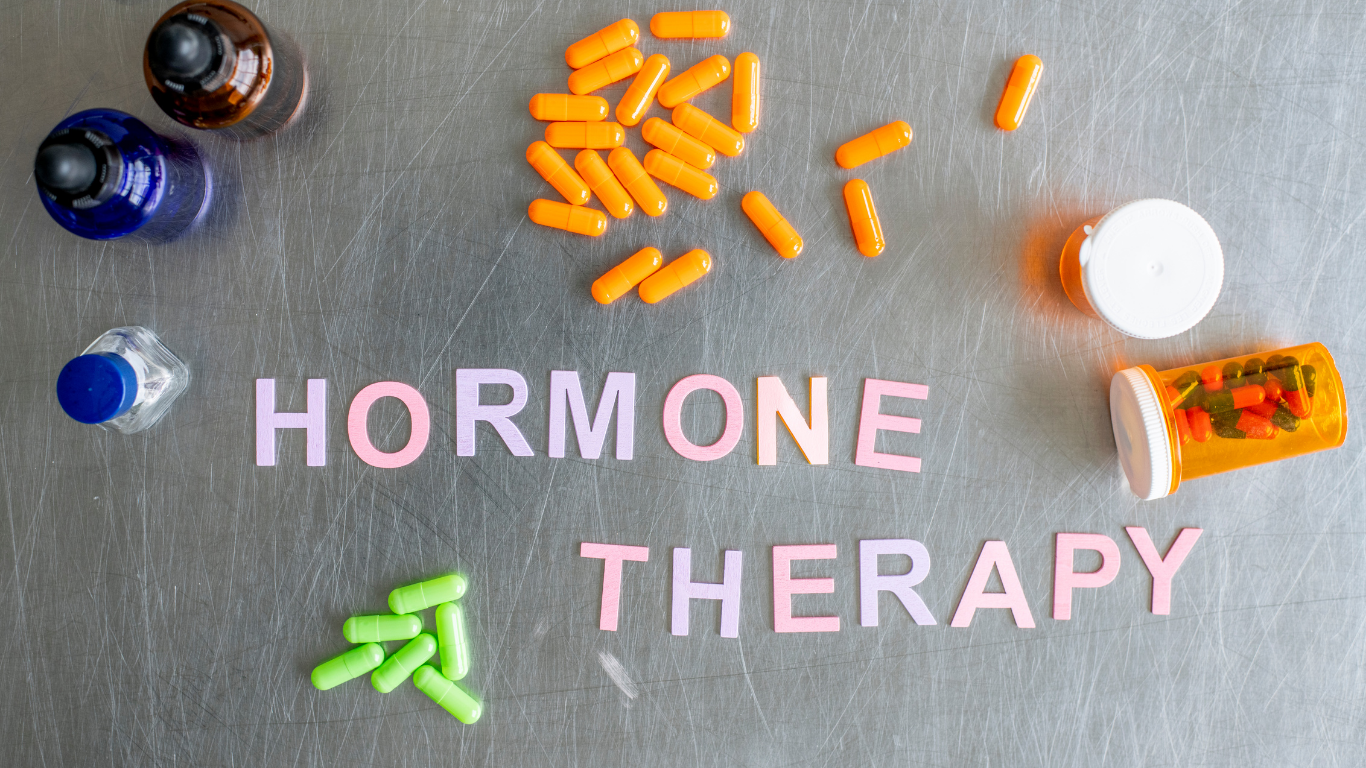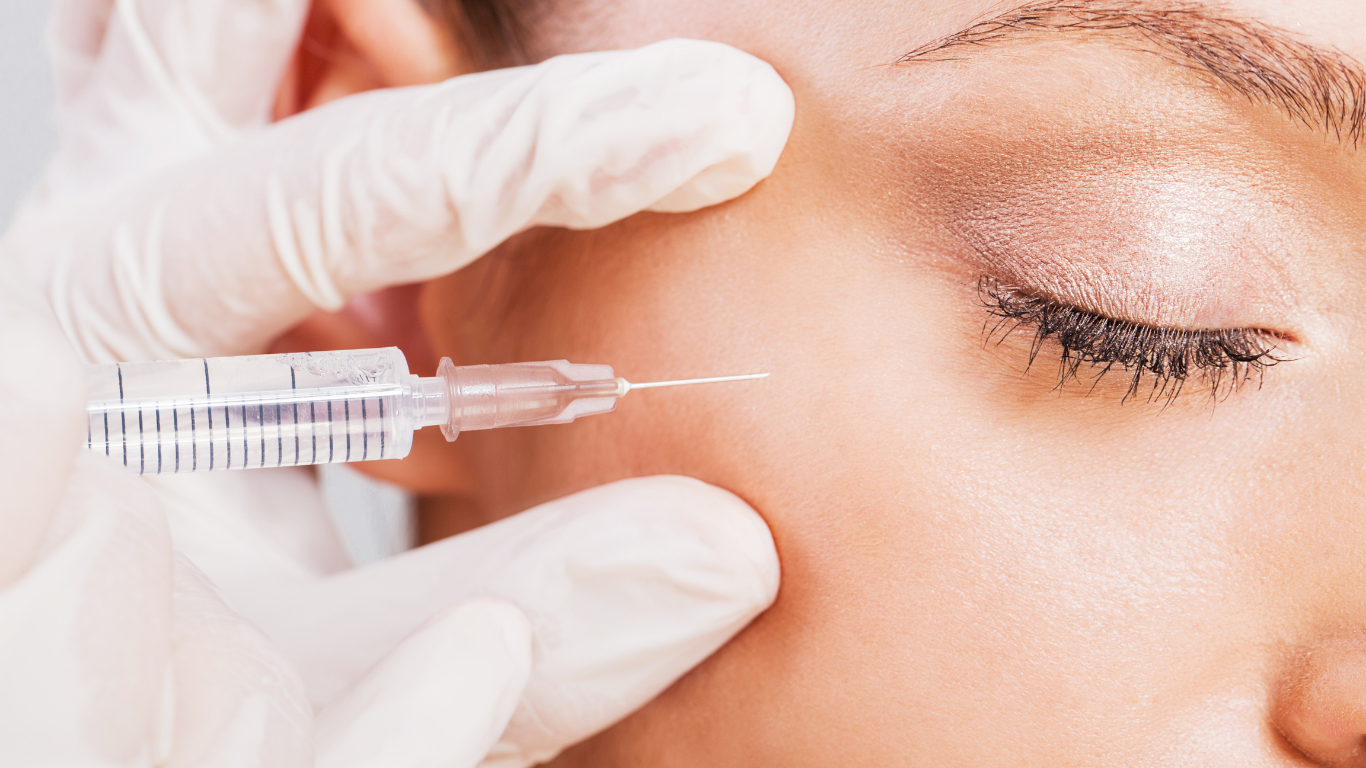Our Blog
Learn more about the latest cosmetic procedures here at The Studio Med Spa

Losing weight can be challenging in today’s fast-paced lifestyle, and often requires more than one approach to achieve results. In recent years, weight loss injections such as GLP-1 and MIC-B12 shots have increased in popularity. These treatments can help you feel fuller for longer, resulting in smaller portion sizes and ultimately aiding in effective weight loss. While weight loss injections have demonstrated multiple success stories over the years, the real secret isn’t the injection alone. Ideal results are achieved through a combination of injections, along with a supportive plan that includes a healthy diet and regular exercise, particularly weight training. How Do Weight Loss Injections Work? GLP-1 is a naturally occurring hormone produced in your small intestine. It’s responsible for triggering insulin release, blocking glucagon secretion, increasing satiety, and slowing digestion. Our weight loss injections mimic this hormone, sending signals to the brain that promote fullness. The combined effect of reduced appetite and slower digestion results in a calorie deficit and supports healthy weight loss. GLP-1 injections enhance insulin secretion and inhibit glucagon release, which manages blood sugar levels, particularly for individuals with type 2 diabetes. Our treatments may also reduce the risk of heart disease and strokes. What Are The Benefits of Strength Training for Weight Loss? Strength training is a key component in a holistic health and fitness plan. It aids in weight loss by increasing your metabolism, which burns more calories at rest and post-workout. Muscle building and fat loss often go hand in hand, as strength training helps build lean muscle mass, which is more metabolically active than fat. Muscle tissue burns more calories at rest than fat tissue, so building muscle increases your overall resting metabolic rate. After a training session, your body continues burning extra calories while it recovers and restores the muscles. It’s known as the afterburn effect, which lasts for hours after a workout and can lead to greater results than low-intensity exercises. Strength training provides numerous benefits. This type of exercise helps lose fat while increasing muscle mass, leading to a leaner appearance and enhanced body composition. Regular resistance exercises, such as weightlifting, result in a shift in body composition by increasing calorie expenditure, boosting muscle mass, and decreasing fat mass through post-exercise oxygen consumption and greater nutrient redistribution to muscle tissue. These combined effects help decrease harmful abdominal fat and lower the risk of chronic disease. Weight-bearing exercise can help strengthen bone growth, which in turn can help prevent osteoporosis and fractures. Training helps reduce the risk of cardiovascular disease, including high blood pressure and elevated cholesterol levels. Resistance training can improve mood by releasing endorphins and boost overall energy levels. A comprehensive training schedule can help increase strength and muscle tone, making everyday activities easier and enhancing your overall quality of life. Why is Combining Weight Loss Injections With Strength Training Effective? Combining weight loss treatment with high-impact weight training creates a powerful synergy that surpasses the benefits of either approach alone. While injections reduce your appetite and ultimately promote fat loss, physical training preserves and builds muscle. While fat-loss injections help you shed the pounds, some of that weight may come from lean muscle. Muscle burns calories, so it’s vital to maintain or build muscle for a healthy metabolism during fat loss. Lean muscle preservation supports long-term weight loss during your injection treatments and helps prevent weight gain afterwards. Research suggests that three to four strength-based workouts per week, combined with aerobic exercise, can help protect muscle and bone health while on GLP-1 therapy. The combination of fitness and injections maximizes fat loss for a more substantial, sustainable transformation. Lifestyle and Safety Considerations We advise patients new to weight loss treatments and exercise to monitor their performance throughout the treatment. Tracking your weight, activity levels, dietary intake, and daily mood is essential for maintaining safety and achieving success. Lifestyle adjustments should include prioritizing strength training, staying hydrated, a nutrient-dense diet, and gradually increasing your workout intensity. Resistance training – focus on strength training to maintain or build muscle mass, which may decrease during weight loss injection treatment. Gradual exercise program – start with low-impact weight loss training and slowly increase the intensity and duration each week. Listen to your body – pay close attention to your energy levels and adjust your workouts when needed to prevent fatigue and burnout. Healthy diet – stick to a diet rich in whole foods, fiber, and protein to support energy levels, preserve muscle, and aid in digestion. Mental health awareness – keep mindful of mood changes and ensure you’re surrounded by a supportive environment to manage potential mood swings or challenges. The Studio Med Sap Supports Healthy and Sustainable Weight Loss At The Studio Med Spa, we believe true success goes beyond the number on the scale. Our combination weight loss strategies blend the latest medical treatments, such as GLP-1 weight loss injections, with personalized guidance on fitness and strength training. This pairing not only helps you shed unwanted fat but also protects lean muscle, maintains a strong metabolism, and enhances overall body composition. Our team is here to support you throughout your transformation, ensuring your weight-loss journey is safe, effective, and sustainable. Book your consultation today for a healthier, stronger, and more confident long-term weight-loss solution.

Hormone replacement therapy is gaining popularity among women, thanks to its potential to stabilize hormone fluctuations and alleviate symptoms of menopause. HRT can replace declining estrogen and progesterone levels, which can promote better sleep, ultimately improving mood and anxiety disorders. For many women, PMS can be a rollercoaster of mood swings, fatigue, and irritability that affects daily life. While lifestyle changes and over-the-counter remedies assist, more women are exploring HRT as a way to address hormonal imbalance. At The Studio Med Spa, there’s a growing interest in HRT not just for menopause, but for easing the symptoms that come with PMS. Understanding PMS, Mood Swings, and Hormonal Imbalance For many women, the days leading up to their period bring more than just physical changes. Premenstrual Syndrome (PMS) can affect the body and mind, showing up as cramps, fatigue, mood swings, or irritability. These symptoms are associated with natural fluctuations in estrogen and progesterone levels that occur during the menstrual cycle. In some cases, symptoms become more severe, leading to Premenstrual Dysphoric Disorder (PMDD). This condition is a severe form of PMS characterized by intense emotional and physical symptoms, such as violent mood swings, depression, anxiety, and debilitating fatigue, which significantly interfere with a woman’s ability to function daily. What’s the Connection? Hormones do more than regulate the cycle; they also influence brain chemistry. Estrogen and progesterone influence serotonin, the neurotransmitter that helps regulate mood, sleep, and appetite. When hormone levels rise and fall, serotonin levels can also fluctuate. Thus, some women feel more emotional or short-tempered during this time. Not everyone responds to these changes in the same way. Some women are more sensitive to hormonal shifts, whether due to genetics, underlying health conditions, or a combination of both. While PMS is ubiquitous, PMDD’s symptoms are strong enough to interfere with work, relationships, and daily life. Benefits of HRT for Symptom Relief HRT isn’t only about easing PMS or balancing mood; it can make a positive difference in how women feel physically and emotionally. Many find that balanced hormones lead to improved symptoms. · Menopausal comfort – Hot flashes, night sweats, and vaginal dryness are some of the most common struggles during menopause. HRT can ease these symptoms and help women feel comfortable again. · Better mood and sleep – By restoring balance, HRT may reduce mood swings, calm anxiety, and support better sleep. · Bone health – Estrogen plays a crucial role in maintaining healthy bones. Replacing declining levels can lower the risk of osteoporosis and fractures later in life. · Sexual well-being – For many, HRT relieves vaginal dryness and makes intimacy more comfortable, which can boost confidence and overall sexual health. · Brain support – Some studies suggest that when started early in menopause, HRT might protect memory and lower the chances of dementia. · General well-being – By easing physical discomfort and emotional strain, HRT often helps women feel healthier, more energetic, and more in control. Why Tailored Treatment Matters Individualized therapy, paired with hormone testing, helps us create effective HRT treatment plans . We believe tailoring therapy to your unique needs improves treatment outcomes by targeting specific hormone levels. This personalized approach helps to minimize potential side effects and prevent illness associated with hormonal imbalance. Understanding Individual Needs · Unique symptom profiles – every woman experiences different hormonal changes, with varying symptoms. Hormonal testing reveals these distinct imbalances. · Personalized assessment – a comprehensive evaluation allows for a deep understanding of specific requirements and health status. The analysis includes hormone testing and a medical history review. · Tailored treatment plans – by analyzing your test results, we can modify your treatment plan to include the correct dosages and the most suitable delivery methods. Optimizing Treatment Outcomes When HRT is tailored to your individual needs, the benefits go beyond simple symptom relief. · Fewer side effects – A treatment plan tailored to your body reduces the likelihood of unwanted side effects, making the therapy easier to tolerate. · Better results – By focusing on your specific hormone needs, personalized therapy can be more effective at easing symptoms and improving daily comfort. · Bespoke support – Taking a tailored approach doesn’t just help in the moment, it can also promote better overall health and lower the risk of hormone-related issues down the line. Importance of Customization · Avoiding standardized treatment – regular HRT may not be suitable for all women due to individual responses to the treatment. Bespoke plans ensure the treatment is safe and appropriate. · Addresses specific requirements – custom-made treatment allows us to address various moods, sleep, hot flashes, and other symptoms. · Long-term well-being – by addressing hormonal imbalances proactively, individualized hormone therapy can contribute to long-term health. The Studio Med Spa Approach At The Studio Med Spa, we believe every woman deserves to feel in control of her welfare. Our approach to HRT starts with understanding your unique symptoms, cycle patterns, and lifestyle before recommending a personalized plan. We use thorough testing to identify hormonal imbalances and tailor treatment that supports both physical and emotional health. For many women, this means fewer mood swings, better energy, and a renewed sense of calm throughout the month. It also means having a trusted partner on your wellness journey. We combine advanced treatments with compassionate care, so you feel supported every step of the way. Whether it’s PMS, mood swings, or hormonal changes, we’re here to help you restore balance and lasting relief.

If you’re eating well, exercising daily, and still see no change on the scale, your hormones could be part of the problem. Hormones play their role in weight loss and weight gain. They don’t only control mood or energy, they act as messengers that tell your body when to burn fat, when to store it, and when you feel hungry or full. When they’re out of balance due to age, stress, or lifestyle changes, losing weight can become increasingly complex. It is at this juncture that hormone replacement therapy (HRT) may enter the picture. This treatment aims to restore balance, supporting your metabolism, improving energy levels, and enabling your body to react positively to healthy habits. Key Hormones That Affect Weight Management When it comes to managing your weight, it’s not just about calorie intake. Your hormones play a significant role in this. They influence appetite, metabolism, and fat storage. Insulin Insulin helps your cells absorb sugar from your bloodstream, either for energy or storage. When levels are frequently high, your body stores more fat and burns less. High levels of insulin are typically associated with frequent eating or a diet high in refined carbohydrates and sugar. Balanced insulin levels make it easier for your body to utilize fat as an energy source. Leptin Leptin is made by fat cells and instructs your brain that you’ve had enough to eat. If you have leptin resistance, your brain doesn’t get the message, which can lead to overeating even when you have sufficient stored energy. Ghrelin Known as the hunger hormone, ghrelin is released in the stomach. It rises in anticipation of meals, signaling the body to eat. Dieting often raises ghrelin levels, making you hungrier and sometimes slowing weight loss efforts. Cortisol Cortisol is your body’s stress hormone. When levels stay elevated, food cravings can increase, encouraging the storage of belly fat and slowing down fat burning. Thyroid hormones (T3, T4) Produced by your thyroid gland, these hormones control how quickly your body burns energy. Low thyroid hormone levels slow metabolism and can lead to weight gain, while high levels accelerate it, potentially contributing to weight loss. Estrogen Estrogen determines where your body stores fat. Low estrogen levels often lead to fat storage around the abdomen, which alters your body shape and makes weight loss more challenging. Testosterone Testosterone plays a crucial role in building and maintaining muscle mass, which is essential for a healthy metabolism. Low testosterone levels can lead to muscle loss and an increase in body fat. GLP-1, Peptide YY, and CCK These gut hormones send signals to your brain that you’re satisfied after eating. They also help regulate blood sugar and digestion. Higher levels make portion control easier and reduce the likelihood of overeating. Adiponectin Produced by fat cells, adiponectin helps regulate blood sugar and fatty acid breakdown. Higher levels promote better fat burning and ultimately a lower risk of obesity. How HRT Supports Weight Control Hormone replacement therapy (HRT) can help your body find its balance, especially during menopause when hormonal changes make weight difficult to manage. While it’s not a quick fix for losing weight, HRT can support your metabolism, help your body respond more effectively to insulin, preserve muscle, and even help regulate your appetite. · Improve metabolism – a regular metabolism can result in a higher calorie usage, leading to increased fat burn. By restoring regular hormone levels, HRT can help prevent the accumulation of abdominal fat, which often occurs during menopause. · Enhance insulin sensitivity – menopause often upsets your body’s insulin response, leading to increased fat storage. Balancing hormone levels may enable your body to regulate blood sugar levels better and reduce fat deposition. · Promoting muscle mass – estrogen, a key hormone in HRT treatment, can help preserve and even increase muscle mass. The effect may be a boosted metabolism that supports weight management. · Regulating appetite – hormonal changes can affect appetite and food cravings. HRT can help regulate hunger, thereby controlling your ability to manage calorie intake. · Improving energy levels – symptoms like fatigue and mood swings can impact food choices. Easing these symptoms through hormone replacement therapy can promote healthier food choices, which in turn contribute to better weight control. · Better sleep – sleep disturbances are common when hormones are out of sync, which can contribute to weight gain. HRT improves your quality of sleep, which has a positive impact on your overall health. Balancing Hormones for Weight Regulation at The Studio Med Spa At The Studio Med Spa, we understand that weight struggles aren’t always about exercise and food intake. Your hormones often play a much bigger role than you think. By identifying and addressing hormonal imbalances, we can help you restore your body’s natural rhythm. This treatment not only makes it easier to burn fat and maintain a healthy weight, but it can also increase energy levels and promote better sleep. Whether through lifestyle guidance, targeted treatments, or hormone therapy, our goal is to help you feel in control of your body again. Contact us today to create a personalized plan to get your body back on track.

The endocrine system helps to control and regulate your metabolism. It uses hormones to control how your body converts food into energy while managing various metabolic processes. Ghrelin and leptin are the two primary hormones that play intricate roles in regulating appetite and energy balance. Produced in the stomach, ghrelin stimulates hunger, while leptin, produced by fat cells, signals satiety to the brain. They act on the hypothalamus, a part of the brain responsible for regulating appetite and metabolism. The Role of Hormones in Weight Regulation Hormones play a vital role in regulating weight and fat distribution. They help control your weight and how your body stores fat. Estrogen, progesterone, testosterone, insulin, thyroid hormones, cortisol, leptin, and ghrelin all affect metabolism and appetite. When these hormones are out of balance, your body is more susceptible to gaining weight, especially around your abdomen. This imbalance can also make it harder to lose weight. Estrogen and Progesterone In females, these sex hormones influence the distribution of fat. During menopause, women typically experience lower levels of these hormones, which may lead to an increase in abdominal fat. Estrogen also plays a role in appetite and calorie burn. Decreased estrogen levels can lead to increased appetite and a decrease in metabolism. Testosterone In males, testosterone plays a significant role in influencing muscle mass and fat distribution. Decreased levels of this hormone often lead to fat storage, usually around the abdomen. Insulin Insulin regulates blood sugar levels and promotes the storage of fat. High insulin levels can lead to increased fat storage, usually around the stomach. Excess insulin is often associated with a condition where cells become less responsive to insulin, potentially leading to type 2 diabetes. Thyroid Hormones – T3 and T4 These hormones regulate metabolism. Hypothyroidism, or an underactive thyroid, slows down the metabolism, leading to potential weight gain. Hyperthyroidism, or an overactive thyroid, speeds up metabolism, leading to weight loss. Cortisol Cortisol is the body’s stress hormone that can increase appetite and promote fat retention. Elevated cortisol levels, often during periods of chronic stress, can lead to increased food consumption and ultimately result in weight gain. Leptin When leptin levels are low, your body responds as if it’s in a state of energy deficiency, triggering hunger cues. High leptin levels signal fullness to the brain, which can reduce overeating. Ghrelin An empty stomach results in increased ghrelin levels, which prompts you to eat. After a meal, levels drop to signify satisfaction. Maintain a balance of these hormones through various factors, such as a balanced diet, regular physical exercise, and effective stress management, to sustain a healthy lifestyle. How HRT Impacts Metabolism and Weight Hormone replacement therapy addresses hormonal imbalances, particularly during menopause. This treatment can help regulate appetite, improve insulin responsiveness, and potentially influence the muscle-to-fat ratio. It’s important to note that HRT is not a guaranteed weight loss solution, as individual responses vary. Factors like diet and exercise also play a crucial role in weight management. Metabolic rate – HRT can improve metabolic function, potentially helping the body burn calories more efficiently. Fat distribution – studies suggest that HRT can encourage healthy fat distribution, potentially reducing abdominal fat storage. Insulin sensitivity – HRT may optimize insulin efficiency by helping the body regulate sugar levels and reducing fat deposition. Appetite regulation – hormonal changes during menopause can disturb appetite. Hormone replacement therapy helps to regulate appetite, ultimately managing calorie intake. Muscle mass – estrogen, a hormone used in HRT, can help preserve and even increase muscular development. This can boost metabolism and aid weight control. Energy levels – HRT can improve energy levels, which in turn can lead to increased physical activity and higher calorie expenditure. When to Consider HRT for Weight Management Hormone replacement therapy for weight management is usually considered due to ineffective traditional weight loss methods. You’re an ideal candidate if there’s a strong correlation between hormone fluctuations and weight gain, particularly during menopause. If you’ve gained weight after entering your menopausal phase, HRT may be a solution. Our therapy can help to redistribute visceral fat, which is usually associated with increased health risks. If symptoms such as hot flashes or sleep disturbances interfere, HRT can help improve your quality of life. Early cessation of menstruation, usually before the age of 40, means that hormone replacement therapy could be a viable option. Replacing the deficient hormones can ease the uncomfortable symptoms of menopause and even prevent the long-term health risks associated with premature menopause. Optimizing Your Weight With The Right Support Balancing your hormones is a vital aspect of managing your weight and metabolism, particularly during midlife and beyond. Hormone Replacement Therapy can help restore hormonal balance, reduce stubborn fat, and improve energy levels. However, it’s not a magic fix. It works best when combined with a healthy lifestyle. That’s why you need a personalized approach. Nutrition, movement, sleep, and stress management all play a role. When these areas align with HRT, your body can respond more effectively to hormonal changes. As a result, you may see changes not only on the scale, but in how you feel every day. It’s essential to work with a knowledgeable healthcare provider. We can guide your treatment, monitor your progress, and adjust your plan as needed. Book your consultation today and start your journey forward with confidence. Contact The Studio Med Spa today.

Hormone imbalances can significantly impact mental clarity and cognitive function, leading to symptoms like brain fog, memory problems, and difficulty concentrating. Imbalanced hormones can affect mood, causing depression, anxiety, and emotional instability. Various factors, including stress, age, and lifestyle choices, can impact hormone levels. Understanding the connection between hormones and mental health is vital in identifying potential issues and receiving appropriate treatment. How HRT’s Address Fatigue and Boost Energy HRT can be effective in overcoming fatigue and boosting energy levels, particularly during perimenopause, menopause, and andropause ( decline of testosterone or male menopause). By replenishing declining estrogen, testosterone or progesterone levels, HRT can alleviate symptoms like night sweats and disrupted sleep, which contribute to fatigue. By improving sleep quality, patients feel rested during the day, which in turn leads to clear and productive cognitive function. Low hormone levels can impact serotonin and dopamine, the brain chemicals associated with mood and motivation. HRT stabilizes these neurotransmitters, reducing emotional fatigue and providing a boost in mental clarity. HRT and Cognitive Function: What the Research Says Research on HRT yields potential benefits, especially for younger women. The timing of HRT proves to be a crucial factor, with younger women experiencing positive cognitive benefits when using hormone replacement therapy . Early initiation – some studies suggest that HRT, particularly when introduced at the onset of menopause, may preserve cognitive function. This effect may slow down the impact of cognitive decline associated with aging. Specific cognitive domains – research indicates that HRT may have a positive impact on specific cognitive domains, including memory and verbal fluency. Brain health – HRT has been linked to larger brain volumes and improved cognitive function in females with the APOE4 gene, which increases the risk of Alzheimer’s. Better mood and sleep – HRT can improve mood and sleep quality, which indirectly benefits cognitive function. Libido - testosterone replacement in males supports healthy sexual functioning, muscle mass and bone density. Reducing Brain Fog in Females: The Science Behind HRT Brain fog is often a common symptom of menopause. HRT can help alleviate brain fog by addressing the hormonal fluctuations that impact cognitive function. This treatment can also improve memory, focus, and clarity by balancing hormones, supporting brain function, and enhancing neurotransmitter activity. Estrogen plays a crucial role in female brain health, affecting areas such as the hippocampus, a part of the brain central to learning and memory. When estrogen levels decline during menopause, it can lead to cognitive changes like brain fog. HRT replenishes the declining estrogen levels and can potentially reverse these effects. Other menopausal symptoms, like sleep deprivation and mood swings, can aggravate brain fog. HRT helps alleviate these symptoms, which, in turn, can reduce the severity of brain fog. Hormones and Stress: What You Need To Know Stabilized hormones play an essential role in maintaining mental health and enhancing stress tolerance. Estrogen, progesterone, and cortisol influence neurotransmitter activity, which directly affects mood and stress tolerance. Imbalances in these hormones can lead to mood disorders, anxiety, and low stress resilience. When hormones are in balance, the body is better equipped to handle stress. Stabilized cortisol levels allow us to adapt to stressful situations and, in turn, improve our overall mood. By promoting mood regulation and reducing stress-induced symptoms, maintaining sufficient hormone levels can enhance our ability to cope with challenges. Understanding the intricate relationship between hormones and mental health can empower you to seek appropriate support or treatment. Choosing treatments like HRT can lead to enhanced emotional stability and better quality of life. Lifestyle Tips to Complement HRT for Mental Clarity To maximize the benefits of hormone replacement therapy, it’s crucial to integrate a healthy lifestyle. Healthy habits include a balanced diet rich in nutrients and antioxidants, regular physical activity, and effective stress management techniques. Prioritizing sleep and maintaining social connections can also enhance cognitive function and mood during treatment. Nutrient-rich foods – maintain a diet of fruits, vegetables, lean proteins, and whole grains to support hormonal balance and brain health. Antioxidants – incorporate foods high in antioxidants to combat oxidative stress and protect brain cells. Specific nutrients – consider foods rich in calcium and vitamin D, which contribute to healthy bones, especially during menopause. Hydration – stay actively hydrated, as a dehydrated body can impair cognitive function. Regular exercise – include aerobic and strength training in your daily routine to improve mood, energy levels, and cognitive function. Yoga, walking, and swimming can improve tension and promote healthy sleep patterns. Stress management – practicing relaxation techniques such as mindfulness, meditation, and deep breathing exercises - can reduce stress hormones and even improve hormone absorption. Prioritize sleep – Create a restful environment for improved sleep quality. Sufficient sleep recovers brain function and mood. Reduce screen time before bed for better sleep hygiene. Stay socially connected – engage in social activities and maintain connections with family and friends to stimulate cognitive function and improve mood. By incorporating these lifestyle tips alongside HRT, you can optimize your mental clarity and well-being during this phase of life. The Studio Med Spa Supports Long-Term Wellness HRT can do more than ease physical symptoms. It can help restore the mental clarity, focus, and energy that hormonal changes often steal. If you’re feeling foggy, drained, or overwhelmed, please don’t hesitate to talk to us. With the proper support, HRT could help you feel like yourself again.

Weight loss injections , such as GLP-1 receptor agonists, can be effective for some individuals, but they’re not a universal solution. Eligibility typically involves a BMI of 30 or above, or a BMI of 27 or higher with weight-related health conditions. A complete medical assessment is essential to determine suitability. It considers your health history, medications, and lifestyle commitment. Am I A Good Candidate for Weight Loss Injections? If you’re struggling to lose weight through diet and exercise, you might be wondering if weight loss injections are right for you. This option isn’t for everyone, but it can be a powerful tool when combined with medical guidance and lifestyle changes. High BMI – individuals with a body mass index of 30 and over are considered obese, and are therefore eligible for weight loss injections. High BMI with comorbidities – a BMI of 27 and above that experiences weight-related health issues like hypertension or sleep apnea may be eligible. Unsuccessful lifestyle adjustments – we consider weight loss injections for candidates who can’t achieve their desired results through diet and exercise. Long-term commitment – our medications require ongoing medical supervision and commitment to lifestyle changes. Who Shouldn’t Consider Weight Loss Injections? While weight loss injections may be effective for many, they aren’t suitable for everyone. Some health conditions and risk factors may make this option unsafe or less effective for some. Pregnant and breastfeeding women – we do not recommend this treatment to those pregnant or breastfeeding due to the lack of sufficient safety information and evidence. Weight loss injections may affect how the body absorbs medications, which could pose potential risks to a developing baby. Existing health conditions – individuals with a history of pancreatitis, medullary thyroid cancer, or specific hormonal conditions may not be suitable candidates. Lack of commitment – If you’re not prepared to make necessary lifestyle changes in conjunction with the medication, it’s unlikely to be effective. Weight loss injections are a helpful tool, although they’re not suitable for everyone. We’ll conduct a thorough evaluation before starting your treatment to determine your eligibility and create a personalized weight loss plan . What to Expect From Weight Loss Injections: Results and Timeline Most patients notice a change around three weeks after the first injection. Although some clients report noticeable differences sooner, remember that everyone’s body responds differently to the treatment. In the first month of treatment, you can expect to see changes in your appetite. You’ll feel fuller for longer, with fewer hunger pangs throughout the day. With this in mind, we recommend incorporating healthy habits into your daily routine. Over the next few months, you can expect to experience gradual weight loss due to the injections and healthier lifestyle choices. By the end of month two, patients lose up to 4% of their body weight, and by month three, up to 6%. Benefits Beyond Weight Loss Being overweight brings serious health threats. A BMI of 30 and over has a four times higher heart disease, stroke, and diabetes risk than a healthy BMI. Our programs not only assist with weight loss, but they also address other areas of health and wellness. Reduced risk of diabetes – initially created to manage type 2 diabetes, GLP-1 medications lower blood sugar and improve the body’s use of insulin. Better heart health – obesity is a significant contributor to heart disease, but GLP-1 medication can help. This medication reduces inflammation, regulates cholesterol levels, and reduces the risk of heart failure. Protects kidneys – obesity and diabetes can often result in kidney disease. GLP-1 medications protect the kidneys by slowing the development of kidney disease, especially in patients with diabetes. GLP-1 helps reduce strain on the kidneys, allowing them to remove waste from the body effectively. Improved liver function – the liver is a major organ affected by obesity, and often where we see the first signs of damage. When the liver function improves, it’s a sign of overall health improvement. Reduced joint pain – Being overweight puts a significant strain on joints, such as the ankles, knees, and hips. Losing weight can improve movement and ease the pain associated with osteoarthritis. Improved sleep – obesity and sleep apnea are often closely related. This condition inhibits sleep patterns, which can affect your overall health. GLP-1 medication can reduce the need for CPAP treatment, as you lose weight and improve breathing. Boosts brain health – recent studies suggest that GLP-1 medications can lower the risk of Alzheimer’s disease while improving cognitive health. The meds reduce the inflammation that contributes to cognitive decline. Besides a number on the scale, the actual value of a healthy lifestyle lies in improved sleep, energy, and long-term wellness. Setting Expectations for a Healthier Future Weight loss injections can be valuable in your health journey, but they’re not a magic fix. It’s essential to recognize that results take time and should be complemented by a healthy diet, regular exercise, and ongoing monitoring. Setting realistic expectations from the start can help you stay motivated and avoid disappointment. Not everyone will respond in the same way, and that’s okay; your journey is unique. If you’re considering this option, book a consultation with us to assess your eligibility and develop a personalized plan tailored to your body and goals. Sustainable change always starts with informed decisions. Contact us today.

Botulinum toxin, also known as Botox , is a neurotoxin that temporarily freezes muscles. Commonly used in cosmetic treatments, its primary purpose is to reduce fine lines by relaxing the muscles that cause them. Botox also has medical applications, including the treatment of excessive sweating, chronic migraines, and muscle spasms. Common Cosmetic Areas Treated with Botox The most popular areas for cosmetic Botox injections include the forehead, the area between the eyebrows, and the surrounding eye area. Additionally, aesthetic doctors use Botox to combat bunny lines, lip lines, chin dimples, and neck bands. Here’s a more detailed explanation: · Forehead: the horizontal lines that appear when raising the eyebrows. · Frown lines (glabellar lines): the vertical lines between the eyebrows that appear while frowning. · Crow’s feet: lines at the outer corners of the eyes, caused by squinting and smiling. · Bunny lines: lines that appear on your nose when you wrinkle it. · Chin (mentalis): often treated to reduce dimpling and create a smooth appearance. · Jawline and neck: used to soften fine lines on the neck and create a more defined jawline. · Around the mouth: used to reduce ’smoker’s lines’ around the lips, or to create a ‘lip flip’. The effects usually last between 3 and 6 months. We recommend regular follow-up treatments to maintain your results. Common Areas Treated Medically with Botox Medical practitioners use Botox for non-cosmetic medical procedures, too. Treatments include, among others, extreme sweating, muscle spasms, teeth grinding, and tension headaches. · Hyperhidrosis: underarms, palms, and soles benefit from Botox injections to reduce excess perspiration. · Dystonia: Botox injected into affected muscles can reduce stiffness and spasms in conditions like cervical dystonia and spasms relating to cerebral palsy. · Chronic migraines: injections into specific parts of the head and neck can help reduce the frequency of migraines and even prevent future headaches. · Temporomandibular Joint Disorder (TMJ syndrome): Botox injections into the jaw muscle can relieve pain and tension, as well as reduce teeth grinding. What To Expect From Botox Injections Botox injections are generally safe with minimal side effects, but it’s important to know what to expect. Potential after-effects include temporary discomfort, and redness or swelling at the injection site, usually subsiding within a day. Certain patients may experience bruising, although this is unlikely. The timeline varies between people, but initial results are usually noticeable within a few days. The full effect of Botox takes between 1 and 2 weeks to become apparent. Botox injections provide subtle and natural-looking results when administered by a qualified practitioner. Don’t expect an instant, intense change; instead, expect a smoother, more refreshed appearance. The effects of Botox treatments are not permanent, which is why we recommend regular maintenance appointments to maintain your smooth-looking skin. Results last between 3 and 6 months, after which muscle movement gradually returns to normal. Factors like metabolism, lifestyle, and the area treated can affect the results timeline. Botox FAQs · How long is the recovery time post-cosmetic treatment? There’s minimal downtime associated with Botox treatment. You can return to your daily routine immediately after your appointment. · How many units do I need? For moderate to deep forehead lines and frown lines, the FDA approves a maximum of 20 units of Botox. The FDA approves a maximum of 12 units on each side for crow’s feet. · Is there sufficient research on Botox? With over 20 years of research, Botox is the most studied treatment in its class. One hundred countries worldwide have approved the use of cosmetic Botox, with 574 peer-reviewed scientific articles available on its safety and efficacy. · How do lines and wrinkles form? Facial lines form due to a combination of factors, including UV exposure and collagen reduction. Repetitive muscle movement causes skin to fold and crease, resulting in facial lines. Botox injections work beneath the epidermis to temporarily reduce the muscle activity that causes these lines. · How old do I have to be to start Botox treatments? The minimum age to start cosmetic Botox treatments is 18, as it’s an age-restricted treatment. We generally recommend it to patients over 25, as this is when collagen production declines and lines become more noticeable. · How can I make my Botox last longer? To prolong the effects of Botox, focus on proper aftercare, a consistent skincare routine, and a healthy lifestyle. Avoid excess sun exposure, manage your stress levels, drink plenty of water, and consider a zinc supplement. · Can I exercise after my treatment? Although exercising won’t damage the effects of the injections, you could hamper the recovery process. The increase in blood pressure and heart rate could aggravate bruising at the injection site. · What is the Botox four-hour rule? The four-hour rule means that for four hours after your treatment, you should stay upright and avoid lying down. This time allows the Botox to settle into the targeted muscles. What Are The Benefits of Botox? Botox has become one of the most popular non-invasive procedures worldwide. Originally used to reduce the appearance of fine lines and wrinkles, its benefits now extend far beyond cosmetic augmentations. Whether you’re looking to refresh your appearance or need relief from medical conditions, Botox offers customizable, science-backed solutions. By relaxing facial muscles, Botox can lead to smoother, even-looking skin, contributing to a more youthful look. It can also work as a preventative measure by reducing the muscle activity that leads to the formation of wrinkles. Migraines, hyperhidrosis, and muscle spasms may all benefit from tailored medical Botox treatments. The Importance of Using Qualified Practitioners for Botox Treatments Choosing a qualified and experienced practitioner is just as important as the treatment itself. At The Studio Med Spa, highly trained professionals administer all our injectables, prioritizing safety and precision. Trust our highly skilled team that’s committed to excellence and client well-being.

After the age of 40, men naturally experience a decline in testosterone levels. While many maintain normal testosterone into their 50s, some begin experiencing low levels as early as their 40s. The symptoms include low sexual desire, diminished energy levels, and decreased muscle mass. This condition is often referred to as male menopause , or andropause, with more gradual effects than the abrupt female menopausal symptoms . Unlike the sudden decline in estrogen and progesterone in females, men’s testosterone levels decrease gradually, at around 1% per year after turning 40. This gradual decline results in symptoms going unnoticed for years before seeking treatment. The Role of Key Hormones in Men’s Health Testosterone, the primary male sex hormone, is central to many aspects of men’s health. These include muscle mass, bone density, libido, and mood. Other hormones like insulin, cortisol, oestradiol, and thyroid hormones also play vital roles in men’s overall well-being. Testosterone also affects red cell production and distribution throughout the body. Insulin regulates blood sugar levels and helps the body convert food into energy. Cortisol is the body’s stress hormone, regulates blood sugar, and controls brain function. Oestradiol plays a vital role in male reproductive health, which includes libido, erectile function, and sperm production. Thyroid hormones regulate metabolism, energy levels, weight, and hair growth. What is Bioidentical Hormone Replacement Therapy for Men? BHRT involves replacing deficient hormones with those that have an identical molecular composition to the hormones produced naturally in the male body. This treatment eases symptoms related to hormonal deficits, such as low testosterone. It improves energy levels, muscle mass, and sexual drive. How Does BHRT Differ From Mainstream Hormone Treatments? These two therapies differ mainly in the source and structure of the hormones used. Bioidentical hormone replacement uses hormones derived from plants such as soy and yams. These naturally occurring hormones are chemically identical to those produced in the human body. In contrast, traditional therapy often uses artificial hormones which are either animal-based or manufactured in a lab. These synthetic hormones contain slight differences in their chemical structure compared to human hormones. Key Differences: The primary differences are as follows: · Hormone source . BHRT uses plant-based hormones to match human hormones. Traditional HRT uses synthetic hormones such as a pregnant mare’s urine. · Hormone structure . The structure of bioidentical hormones matches that of the hormones naturally produced in the human body. Synthetic hormones comprise a slightly different structure, which is altered in a lab. · Regulation . BHRT formulations are often tailored to suit the patient, which makes it difficult for FDA approval. However, many practitioners believe this customized method delivers better results with fewer side effects. The mass production of mainstream HRTs enables simpler regulatory procedures for standardized prescriptions. FAQ Section · What symptoms may indicate that I need BHRT? Common symptoms include decreased energy levels, low libido, mood swings, and irritability. Weight gain, typically around the abdomen, reduced muscle mass, disturbed sleep patterns, and cognitive changes, such as brain fog, are also common symptoms. · How soon will I notice the results of my treatment? Many patients notice results within a few weeks of starting BHRT. Full benefits may take several months as the body adjusts, and we optimize your dosage. Everyone’s body reacts differently to the treatment, so the speed of results will vary. While BHRT can be highly effective, it’s imperative to have realistic expectations about the timeline of results. · Is BHRT safe? BHRT is considered safe when administered by a qualified professional. Many healthcare providers who use BHRT claim they are safer than synthetic treatments. It’s essential to discuss your medical history before starting treatment. · Are there any side effects? Potential side effects can include acne, changes in sleep patterns, and increased red blood cell count. These side effects are usually mild while your body adjusts to the therapy. We conduct regular check-ups and monitor your progress to avoid these risks where possible. · How do you determine my treatment plan? We assess your symptoms, medical history, and test results to create a personalized treatment plan tailored to your specific needs. This evaluation involves a thorough consultation, physical examination, and hormone assessment by either saliva, blood, or urine test. · Is BHRT a lifelong commitment? Some males may need ongoing treatment, while others may only need it for a short period. The duration depends on the patient’s requirements, their response to the therapy, and our ongoing evaluations. · Can lifestyle changes assist the BHRT process? A balanced diet, regular exercise, high-quality sleep, and managing stress all contribute to enhancing the effectiveness of BHRT and can improve overall health. Why Trust The Studio Med Spa for BHRT for Men? At The Studio Med Spa, we understand the health challenges men face as they age. We tailor our Bioidentical Hormone Treatment to your specific requirements. Guided by expert medical professionals and A-grade diagnostics, we evaluate and create a plan that supports long-term vitality and well-being. With a commitment to safety, we’re a trusted partner in restoring hormonal balance and reclaiming your health after the age of 40.

While primarily used to improve physical well-being, weight loss injections can also have a positive impact on mental health. Studies suggest that MIC-B12 and GLP-1-based jabs can improve mood, build confidence, and even reduce the risk of anxiety and depression. Positive Mental Health Effects GLP-1 weight loss injections have increased in popularity due to their effectiveness in supporting physical health and reducing obesity. However, beyond the physical transformation, these injections can also highlight improvements in mental well-being. Successful weight loss can lead to improved self-esteem, a more positive body image, increased confidence, and reduced social anxiety. As a result, these individuals feel more in control of their health and daily lives. Increased energy, high-quality sleep, and improved fitness and mobility further support overall mood and strong mental health. Furthermore, accomplishing weight loss goals can boost motivation and create a sense of accomplishment that further reinforces a healthy lifestyle. When used holistically, weight loss injections possess the ability to transform your body and enrich your mind. What Can I Expect from Weight Loss Injections? While the majority of the focus of weight loss injections revolves around physical transformation, it’s essential to consider the possible psychological effects. These medications can alter your perception of how you feel and affect your physical appearance. Understanding the mental journey of weight loss can better prepare you and help you cope with the exciting changes that come with it. Improved mood. GLP-1 weight loss medications can improve symptoms of depression. The weight loss process can also improve mood and reduce the chances of anxiety. Increased confidence. Achieving weight loss through injections can boost self-esteem, leading to a more positive self-image, which in turn can contribute to improved mental health. Improved cognitive function. Slimming injections can enhance mental clarity by impacting brain function. They may even reduce the risk of neurodegenerative disorders in some recipients. Potential effects beyond weight loss and mental benefits include: Upgraded sleep. Weight loss can contribute to improved sleep patterns, as excess weight often causes issues such as sleep apnea. Enhanced social interaction. Weight loss often reduces the social stigmas associated with obesity, leading to more positive social experiences and improved relationships. Weight loss injections can offer potential benefits to mental and physical health. However, it’s important to note that the extent of mental health benefits varies between people. Approaching these treatments realistically will help you manage your expectations in the long run. The Emotional Impact of Slow or Plateaued Process Dealing with slow-paced weight loss can have a significant emotional impact during your journey. This delay could lead to discouragement and a lack of motivation to continue. While your initial weight loss phase may be accompanied by feelings of excitement, encountering a plateau may disrupt this path. This pause in progress can be challenging to accept, especially when you’ve set yourself impractical goals. There are a few coping mechanisms you can turn to in order to avoid this frustration. Seek support. Share your feelings with friends, family, or someone who has been through or is currently experiencing a similar situation. Focus on the positives. Instead of only concentrating on your weight, celebrate the positives associated with your weight loss journey. Increased physical activity or improved sleep may not be your ultimate goal. Yet, these small victories can help you get through. Reassess and adjust. Sometimes, all you need to do is make minor adjustments to your plan. Increasing daily exercise or eliminating unhealthy foods makes a huge difference. Dealing with temporary obstacles in your weight loss plan can be challenging. The proper support and coping strategies can help you stay on your health journey and reach your goals. What Are GLP-1-Based Injections? Glucagon-like peptide-1, a naturally occurring hormone in your body, regulates blood sugar, appetite, and digestion. GLP-1 injections can help slow down digestion, resulting in a feeling of fullness for longer and ultimately leading to reduced food intake. There are numerous ways our medication can help with weight loss: Reduced appetite Slower digestion Improved insulin sensitivity Why Trust The Studio Med Spa for Weight Loss Injections? Most of us are aware of the benefits of reaching and maintaining a healthy weight . However, the process can be daunting if you’re not prepared. We understand that weight loss is a journey that involves both physical and mental aspects. While weight loss injections are a powerful transformation tool, it’s essential to have the right mindset and support system throughout your treatment. We’re here to guide you, ensuring your wellness plan prioritizes holistic well-being. If you’re considering our weight loss treatments, we invite you to schedule a consultation with us. Let’s explore options that align with your wellness-focused goals.

As you age, your body naturally produces fewer of the hormones required for regulated bodily functions. A hormonal imbalance occurs when you have an excess or a deficiency in one or more hormones. Common symptoms can include weight gain, skin conditions, and mood swings, although symptoms vary according to the type of hormone. If you’ve noticed one or more symptoms, you may have a hormonal imbalance. Understanding Female Hormones Hormones are chemicals that regulate bodily functions by transporting signals through the blood to the organs, instructing them on what to do. They originate from glands in your endocrine system and help control regular bodily processes. The female body contains three primary hormones, essential for regulating menstruation, reproduction, and menopause. Estrogen , produced by the ovaries and adrenal glands, controls many female hormonal roles. These include menstruation, pregnancy, and menopause. Progesterone , produced by ovaries after ovulation, supports early pregnancy and prepares a woman’s body for gestation. Testosterone , although predominantly a male hormone, is also present in small amounts in female bodies. This hormone regulates fertility, sexual desire, and bone density. Common Symptoms in Women While hormones naturally change over the course of your life, you may experience a sudden shift. If you’re undergoing any of the following signs, your hormones may be unstable. Often, these indications may be a warning sign for another condition, including PCOS or ovarian cancer. We advise you to speak to a qualified professional if you have any of these symptoms: Irregular menstrual cycles Acne Excessive hair growth Pain during intercourse Vaginal dryness Low libido Daily fatigue Weight gain Diabetes Infertility Hot flashes Tender breasts Causes and Risk Factors of Hormone Imbalance Symptoms in Women Hormonal imbalances can result from various factors, including lifestyle habits, medical conditions, environmental factors, and medications. Origins can include thyroid issues, tension, eating disorders, and PCOS. Medical Conditions: Thyroid issues – both hyperthyroidism and hypothyroidism can disrupt hormone imbalance. Polycystic Ovarian Syndrome (PCOS) – causes irregular menstruation and excess hormones and may lead to infertility. Eating disorders – anorexia and bulimia disrupt hormone levels by limiting nutrient consumption and decreasing energy levels. Diabetes – type one and two affects hormone production and may contribute to weight gain, stress, and other symptoms. Tumors – benign tumors on the adrenal glands may lead to hormone imbalance. Lifestyle Habits: Stress – chronic stress levels can increase cortisol levels, ultimately disturbing other hormones. This disturbance could lead to mood changes and a decrease in energy. Diet – unhealthy food choices, such as processed foods, unhealthy sugars, and fats, can disrupt hormone levels. Physical activity – an inactive lifestyle can lead to weight gain, promote insulin resistance, and cause hormonal imbalances. Lack of sleep – insufficient sleep can affect hormone production, which can lead to mood swings and low energy levels. Environmental Factors: Endocrine-Disrupting Chemicals – exposure to chemicals found in pesticides and personal hygiene toiletries can impede the endocrine system, causing imbalances. Medication: Some medications, including HRTs and birth control pills, can disrupt hormone levels. Radiation or surgery can also affect hormones, leading to an imbalance. Diagnostic Options If you struggle with symptoms and suspect you may have a hormone imbalance, conducting a professional diagnosis establishes a way forward. A diagnosis typically involves a medical history and physical examination, as well as blood tests, saliva or urine tests, or an ultrasound. It’s essential to visit your doctor as soon as symptoms begin, as timely treatment can help reduce long-term complications. Treating Hormone Dysfunction To address hormonal imbalances, it’s advised to take a holistic approach that includes dietary changes, lifestyle adjustments, and medical involvement. Maintain a healthy weight, eat balanced meals, exercise daily, get enough sleep, and manage stress to support hormonal balance naturally. A well-known medical treatment used worldwide is hormone replacement therapy. HRT addresses low estrogen or progesterone levels and alleviates symptoms associated with menopause. Hormonal birth control medication can help regulate irregular menstruation caused by imbalanced sex hormones. Natural Remedies to Treat Hormone Imbalance We offer a natural counterpart if you’re concerned about the potentially harmful effects of conventional, synthetic hormone replacement therapy procedures. Our bioidentical hormone replacement therapy uses chemically enhanced plant-based estrogens to treat hormonal problems in women. These naturally occurring hormones have the same molecular structure as those produced in the female body. Our ability to match the compounds of your hormones allows the Bioidentical Hormone Replacement Therapy (BHRT) process to transition smoothly with few side effects. BHRT increases your hormone levels to lessen symptoms like hot flashes, night sweats, mood swings, and weight gain. It may also reduce your risk of developing diabetes. Some cases report improved skin hydration and elasticity, resulting in less visible wrinkles and fine lines. Reclaim Your Well-being with The Studio Med Spa It’s important to remember that you’re not alone, and you don’t have to endure discomfort. We offer personalized Bioidentical Hormone Replacement Therapy treatments to empower your health journey. We invite you to a free consultation to take your first step toward naturally restoring your body’s hormonal balance.

